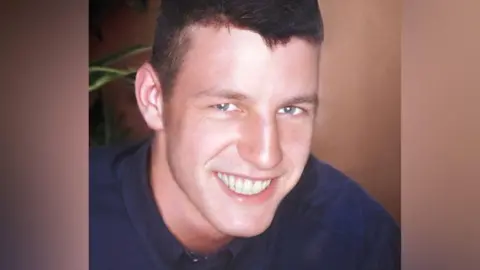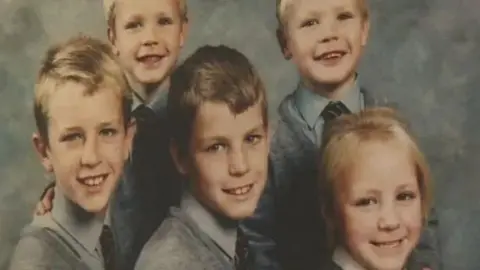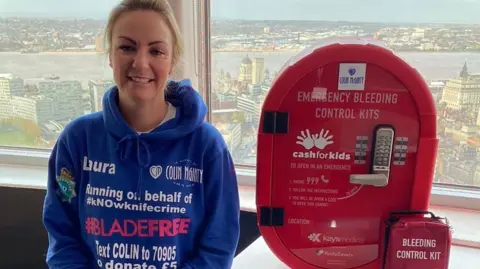The tragic death that inspired knife crime campaign
 Family photograph
Family photographWhen Colin McGinty was stabbed to death in 2001, his death left his family and the wider community reeling.
He was just 21 when he was murdered in Bootle, Merseyside, on a night out with his friends.
On what would have been his 40th birthday, his sister Laura Hughes founded an anti-knife crime campaign in his memory.
As well as going into schools to try to warn young people of the dangers of knives, it installs "bleed control kits" in public places, which are potentially life-saving if someone should suffer a knife injury.
It is through his sister's work with #kNOwKnifeCrime that Mr McGinty's legacy lives on.
Who was Colin McGinty?
 Family photograph
Family photographColin McGinty was from Crosby, Merseyside, and the second of Geraldine and Peter McGinty's five children.
His mother described him as "a good brother and a fabulous son".
She said the qualified joiner, who worked at the Royal Liverpool University Hospital, was "really hard working", while his sister described him as a "very sporty and sociable" man who loved going out with his mates and on holidays.
It was while on a night out with his friends, in March 2001, that was he was chased and stabbed 15 times in what police believed to be a case of mistaken identity.
Two men - Michael Brown and Gary Hampton - were convicted of murdering him.
The pair were jailed for life with a minimum term of 16 years for Mr McGinty's murder.
What is his legacy?
 #kNOwKnifeCrime handout
#kNOwKnifeCrime handoutMr McGinty's family campaigned for tougher sentences for knife crime after his murder and they prompted a review of Parole Board hearing's after they overheard a judge in 2014 saying victim impact statements made "no difference" to parole decisions.
In 2019, when Colin would have been about to turn 40, Ms Hughes said she wanted to do something "positive to honour his memory" and tackle the growing issue of knife crime.
She co-funded the #kNOwKnifeCrime campaign and through sponsored runs and marathons has raised thousands of pounds for anti-knife crime projects.
It has also raised money on behalf of its partner charity Cash For Kids with which more than 500 bleeding control kits have been put in schools, colleges and public places, including all Merseyrail stations.
Ms Hughes has spoken to thousands of youngsters about the traumatic effects of knife crime, and the dangers of carrying a knife or associating with those who do.
As well as providing the potentially life-saving kits, #kNOwKnifeCrime movement also teaches people what to do to help stop a person from bleeding to death.
The 42-year-old said: "We are driven by the heart-breaking reality of how quickly blood loss can be fatal versus the time it takes for an ambulance to arrive."
How can the bleed control kits save lives?
The bleed control kits produced by KnifeSavers, a not-for-profit UK-wide programme that aims to help people to deal with bleeding caused by knife injuries.
Nikhil Misra, a surgeon at the trauma unit at Aintree University Hospital in Liverpool, founded KnifeSavers after seeing "too many people injured because of knives".
He said he wanted to use his "knowledge and skills" to show people "how to control bleeding outside of a hospital".
He added the kits included a special gauze which made blood clot faster, elasticated pressure dressings, and a tourniquet.
What would Colin McGinty think of his legacy?
Ms Hughes said he would "probably laugh" she had done sponsored marathons to raise money, as she had never been a runner.
"I like to think he would be proud though," she said, adding the #kNOwKnifeCrime has big plans to get even more bleed control kits across the region and keep spreading the message about the dangers of knife crime.
Listen to the best of BBC Radio Merseyside on Sounds and follow BBC Merseyside on Facebook, X, and Instagram. You can also send story ideas via Whatsapp to 0808 100 2230.
